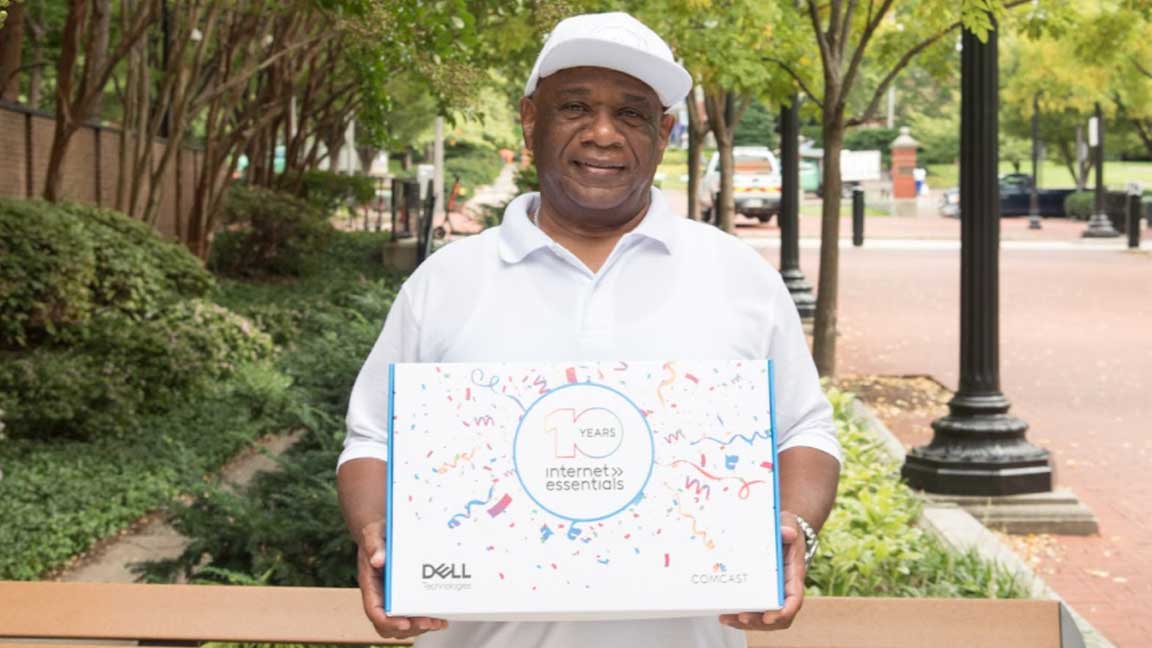Helping Senior Citizens Successfully Navigate the Internet with New Digital Skills: Albert Pannell

First installment of a three-part series on digital inclusion and seniors
in recognition of National Digital Inclusion Week (October 4-8, 2021)
Now more than ever, the internet is central to our everyday lives. We depend on it to find jobs, learn and do homework, stay entertained, shop and access health information. Most importantly, we rely on this technology to stay connected with family and friends.
For some people, including senior citizens, understanding how to use a computer and navigate the internet can be overwhelming. According to a recent study published by the International Telecommunications Union, less than half of the world’s population over 60 years old are online – and engagement declines significantly as age increases.
Albert Pannell was one of these seniors.
Pannell, a 66-year-old Baltimore native, didn’t know how to use a computer and barely knew how to operate a cell phone, until, as a participant in the Cure Club at Johns Hopkins Medicine, he was invited to be part of the Internet Essentials Partnership Program, an agreement between the Johns Hopkins School of Nursing and Comcast. This program provides up to 12 months of high-speed internet service at home plus a free tablet and digital skills training to low-income seniors who qualify.
According to Dr. Kelly Gleason, assistant professor at Johns Hopkins School of Nursing, “The internet is no longer a luxury, and thanks to programs like Internet Essentials, it is more accessible than ever. Working with seniors who did not previously have internet service to spread awareness about affordable ways to connect has been an incredible experience.”
Learning digital skills has been life-changing for Pannell, who feels he’s been exposed to a whole new world. He accesses the internet to communicate with his 12 children and 24 grandchildren, and uses his tablet at church to help others, listen to music and search Bible verses. Soon, he’ll use his new skills and equipment to enroll in the South Baltimore Learning Center’s GED program.
“Like so many other older people, I had my doubts about going on the internet and using all these new devices,” said Pannell. “I had to put my fear aside and just do it. Now, I have a tablet that I received through the program, and I can use search engines, type on the keyboard and use email and Zoom. I’m still learning to be more comfortable using technology, but I have more confidence now than I ever had before.”
“My advice to other seniors is ‘Don’t be nervous. Get out there and learn it,’” Pannell added.
“Mr. Pannell is such an incredible force within his community who understands that educating himself and spreading the word can help many others who would benefit from low-cost internet and digital skills training,” Dr. Gleason said.
For the last decade, through its Internet Essentials program, Comcast has been on a mission to help connect low-income Americans to the internet. Project UP is the company’s comprehensive initiative to help advance digital equity and build a future of Unlimited Possibilities. Backed by a $1 billion commitment to reach 50 million people, Project UP encompasses the programs and community partnerships across Comcast, NBCUniversal and Sky that connect people to the internet, advance economic mobility and open doors for the next generation of innovators, entrepreneurs, storytellers and creators.
Complementing Comcast’s ongoing commitment to keeping customers connected, the company is participating in the federal government’s Emergency Broadband Benefit (EBB) program, a temporary discount program available on all tiers of Xfinity Internet service, including Internet Essentials. New and existing customers who are interested in participating can receive up to a $50/month credit on their internet bill from Comcast and can visit www.xfinity.com/EBB to see what options are available to them, and register.